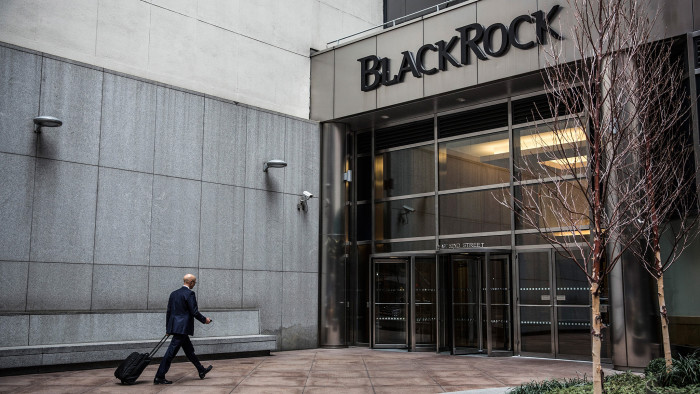BlackRock and Vanguard are smart beta’s biggest winners

Roula Khalaf, Editor of the FT, selects her favourite stories in this weekly newsletter.
BlackRock’s smart beta assets have ballooned by almost 180 per cent to $288bn over the past five years, leaving rival asset managers scrambling to close the gap on the world’s largest fund house.
The figures, collected by Morningstar, the data provider, show the New York-listed investment manager and its chief rival, Vanguard, have been the big winners when it comes to the growth of smart beta.
These strategies, which act as a halfway house between active and passive fund management, have become popular in recent years as investors have sought out market-beating returns at a cheaper price. BlackRock and Vanguard are the only asset managers globally with more than $100bn in smart beta products.
They have benefited from their position as the world’s largest exchange traded fund providers, drawing on their decades of experience in ETFs and factor investing to establish their hold on the smart beta market.
Well known fund managers, such as Deutsche Bank, Amundi and UBS, however, do not even rank in the top 10.
Ben Johnson, director of global ETF research at Morningstar, thinks BlackRock and Vanguard will continue to dominate the leader board.
“It will be exceedingly difficult for anyone to catch up,” he says. “The lead they have could shrink a bit, but I don’t think anyone can overtake them.”
Smart beta strategies typically take a standard index fund but tweak it in an attempt to generate above-market returns, such as by investing based on how cheap stocks are, or on their fundamentals, rather than their market capitalisation.
“There are a whole class of investors who are to some degree disillusioned with active management, but not so disillusioned that they are willing to simply own the market,” Mr Johnson adds. “They want something more.”
Rob Nestor, head of iShares smart beta at BlackRock, says the manager decided this area was a “critical focus” about two and a half years ago, and started pouring in resources. This included hiring Andrew Ang, now head of factor investing strategies at BlackRock and one of the best-known names in the field.
The rapid growth of smart beta in recent years “is sustainable for quite some time”, says Mr Nestor, adding: “We believe we are just in the early days of adoption.”
Morningstar figures going back to 2012 show that ALPS has been the fastest growing of the 10 largest smart beta managers over that time. Its assets under management have increased by more than 4,000 per cent, though from a low base, to stand at $6bn.
Invesco PowerShares and State Street Global Advisors have had the slowest growth in smart beta assets since 2012, at 87 per cent to nearly $50bn and 118 per cent to around $40bn respectively.
Over that time, SSGA has lost its position as the fourth-largest smart beta manager to WisdomTree.
Mr Johnson suggests State Street and PowerShares have not experienced the same rapid growth as their rivals because they have been slow to develop their ranges. “SSGA was much later to the game in bringing strategic beta to the market place,” he says.
Rory Tobin, global co-head of SSGA’s SPDR exchange traded fund arm says that the asset manager only launches a product where it is “convinced of the investment case for it”.
“Our experience is that uptake of a smart beta product varies according to investor appetite for more complex and esoteric approaches,” Mr Tobin adds.
“Even the most vanilla smart beta strategy can seem opaque next to more intuitive market capitalisation-based investments.”
Dan Draper, head of global exchange traded funds for Invesco, says the company recently bought a rival ETF provider, Source, and has announced plans to acquire Guggenheim Investments’ ETF business. He says the businesses offer a range of smart beta ETFs.
Asset growth when it comes can happen fast. Charles Schwab’s smart beta business has expanded by more than 1,600 per cent to $26bn over five years. FlexShares — managed by investment firm Northern Trust — and First Trust have both experienced rapid growth of more than 400 per cent.
Charles Schwab launched its first smart beta funds 10 years ago, but investors began piling in after the strategies developed a track record, says Jonathan de St Paer, head of product strategy and development at the US fund manager.
Over the past few years there has been a rush to market. “We are seeing an explosion of products,” says Mr de St Paer. “I would be really surprised if some of these are around in the next few years.”
However, Ryan Issakainen, ETF strategist at First Trust, which launched its first smart beta funds a decade ago, expects demand to “continue to grow and perhaps grow faster” than at its current rate.
“Most investors may have heard a bit here or there, but they are just becoming familiar with how to use smart beta funds in portfolios,” he adds, “so there is plenty of room for growth.”
Comments